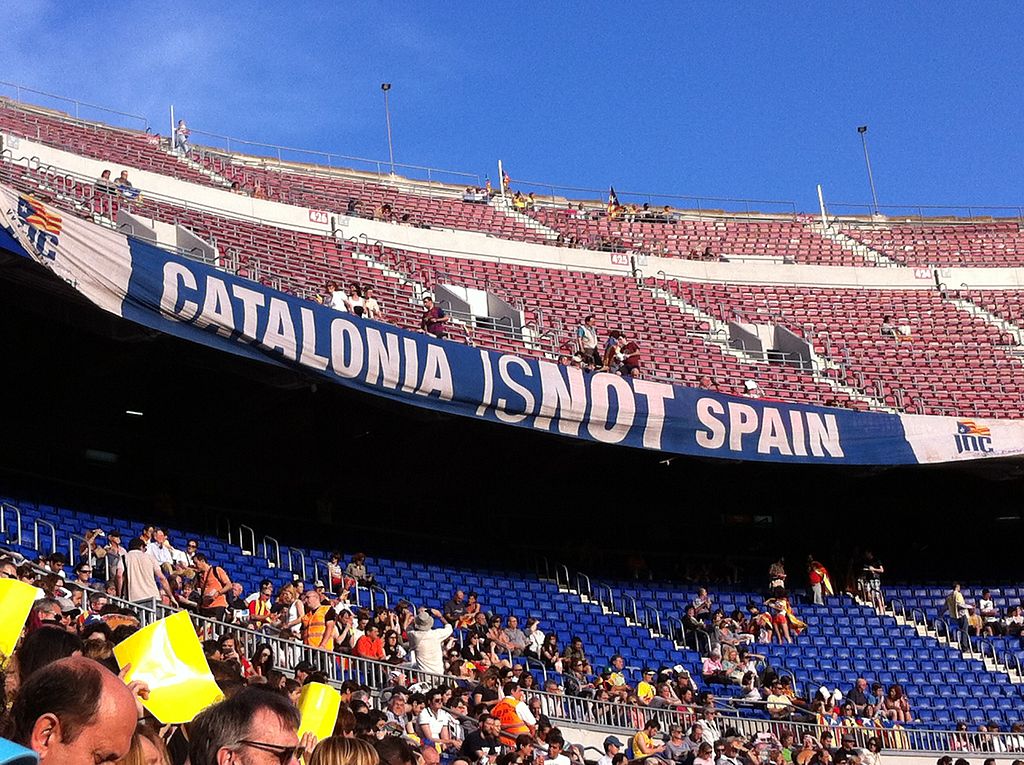Whose sovereignty is it, anyway? Catalonia vs Spain

The wishes of the Spanish government and those of the Catalan people are diametrically opposed: 90% of voters in the referendum were for independence - but keep in mind also that only about half of the Catalan people voted.
Catalonia wants to be independent from Spain. On October 1st, Catalonia held a referendum regarding Catalan independence. This is not the first time Catalonia has tried for a referendum: in November 2014 already, a symbolic independence referendum took place. Symbolic, because the Spanish Constitutional Court had suspended the actual referendum, which the Spanish government had labelled illegal. The Spanish government considers the most recent referendum equally unconstitutional.
The wishes of the Spanish government and those of the Catalan people are diametrically opposed: 90% of voters in the referendum were for independence - but keep in mind also that only about half of the Catalan people voted. The Spanish government invokes the sovereign will of all the Spanish people, while Catalonia considers itself to be a sovereign entity in itself. The two claims to sovereignty clash.
Is there a link between invoking the sovereignty of the Spanish people and the (probable) illegality of the upcoming referendum? There is, but the illegality of the referendum does not imply that the Catalan people might not be sovereign, and it does not mean that independence cannot be achieved – only that it cannot be achieved legally according to the Spanish legal system.
If we take the sovereignty of any people to mean that state power actually emanates from that people, popular sovereignty becomes a matter of sociological fact. How can state power emanate from the people? It does so when the exercise of state power (expressed in legislative, judiciary and executive) is not only efficacious but accepted by sufficiently many of the people. Acceptance, of course, has an impact on efficacy, but efficacy can be reached by means other than collective acceptance: by means of a strong military, for example. The Spanish legal system rests, in this way, primarily on the collective acceptance of the Spanish people—including those in the Catalan region.
If, in the region of Catalonia, this acceptance ceases to exist and instead, the power of a Catalan government to legislate, adjudicate and execute exclusively on Catalan territory is recognised, while this is not recognised by the remainder of the Spanish people (and institutions resting on the acceptance of the Spanish people), the question will become one of efficacy. Many factors can influence efficacy, such as whether the Spanish government would send police and/or army to enforce its legal system or whether it would accept the will of the Catalan people. That the Catalan police refused to obey orders to close down schools and other polling stations indicates that it will be difficult to predict what will happen in this regard.
A new Catalan government independent from Spain would be illegal from the Spanish perspective, but legal from its own. The referendum from October 1st is no more legal than the earlier referendum. Ultimately, however, law is dependent on acceptance and efficacy and these are not matters determined by law, but by social fact. The clash between the two sovereignty claims is not impacted by the fact that from the Spanish perspective, there is no valid legal basis for a referendum that could give voice to the Catalan claim to sovereignty. This means that we can analyse the legal situation – but not what will actually happen.
For a more detailed (if unfortunately already outdated) analysis of questions of secession and sovereignty, see AM Waltermann, ‘Sovereignties’, in particular part 4.4 (available via UM Publications).
This blog was written by Antonia Waltermann
Published on Law Blogs Maastricht
-
 A.M. WaltermannMore articles from A.M. Waltermann
A.M. WaltermannMore articles from A.M. WaltermannAntonia Waltermann is assistant professor of legal theory and legal philosophy. She has a background in comparative law and public international law and expertise in practical philosophy, law and the cognitive sciences, legal reasoning and informal legal logic, legal methodology, and (analytical) legal theory.
Other blogs:
Also read
-
Language plays a fundamental role as a channel for law. It can enable members of society to access justice. Conversely, an inadequate use of language may result in a dissociation of law from a specific society. Language is a fundamental means to convey messages, to know the law, and to shape the law...
-
Comparative law and multiculturalism can evolve together in the classroom at schools of law and result in a fruitful combination. Their interplay should be encouraged.
-
Sovereignty is invoked in many discussions today, from Brexit to Catalan independence, but it is rarely clear what, exactly, those who invoke sovereignty mean by it. For the purposes of understanding, analyzing, and understanding legal phenomena, however, a more precise understanding is necessary.


